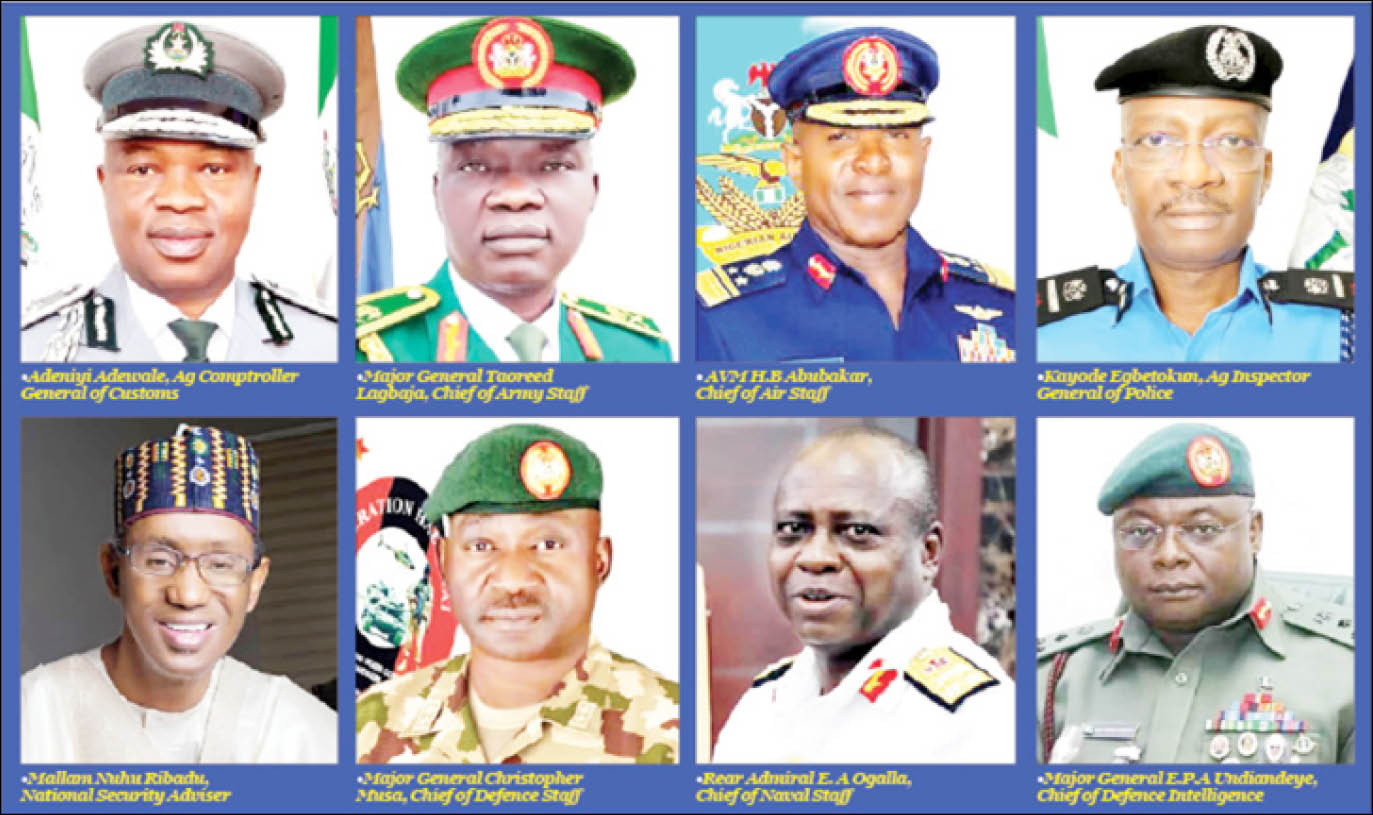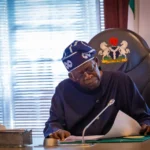Coming about three weeks after his inauguration as the president and commander-in-chief of the armed forces of the Federal Republic of Nigeria, some observers said it was even coming too late as every new president would naturally want to appoint his own people into such sensitive positions that are critical to the fulfillment of the core of his responsibility, which is the protection of lives and property of citizens.
With renewed activities of bandits and criminals across the country, injecting fresh minds into the management of the security architecture of the country would not be out of place.
The new service chiefs appointed by Tinubu include the Chief of Defence Staff, Major-General C.G Musa; Chief of Army Staff, Major- General T. A Lagbaja; Chief of Air Staff, AVM H.B Abubakar; Chief of Naval Staff, Rear Admiral Emmanuel Ikechukwu Ogalla; and acting Inspector-General of Police, DIG Kayode Egbetokun.
In addition, a former chairman of the Economic and Financial Crimes Commission (EFCC), Malam Nuhu Ribadu, became the National Security Adviser (NSA), replacing Babagana Monguno.
- Despite Guidelines, Nigerian Airlines Not Paying Compensation For Delays
- Borno: How Biu, Shani LGAs became open defecation free
While the outgoing service chiefs and the former IGP had done their beats, especially in managing the security of the country, which ensured a peaceful transfer of power from one democratically elected president to another, and in many states where governorship election took place, the increasing activities of bandits, especially in the North West, the renewed hostilities in Plateau and other parts of the country requires a change of tactics in the security management system.
So, the injection of fresh blood into the system could not have come at a better time than when it was done, with renewed hope and optimism that the newly appointed service chiefs would do things differently to arrest the seemingly intractable security challenges bedeviling the country.
The police especially have the enormous responsibility in terms of strengthening the internal security of the country, so the appointment of a new IGP is not only timely but highly strategic.
Egbetokun has close affinity with Tinubu
Among all the appointments, Egbetokun, who is still in acting capacity pending his confirmation by the Council of State during its meeting, is known to have close affinity with the president.
As a Deputy Superintendent of Police in 1999, he was appointed the Chief Security Officer to Tinubu, who was then newly elected as the governor of Lagos State, coordinating the entire security architecture of the state while reporting to Tinubu, who was constitutionally the chief security officer of the state.
He maintained that close relationship with Tinubu until fate smiled on the latter to become the president of the country.
Having risen through the ladder to become a Deputy Inspector-General of Police (DIG), a rank he was decorated with in April, he had the brightest chance of rising to the highest pinnacle of his career to become the IGP, which is exactly what has happened.
Now, he is challenged to justify the confidence reposed in him because any security lapse would be a failure on the part of the president, who has sworn to protect the lives and property of Nigerians.
Political calculation, federal character
Apart from the appointment of the IGP, Tinubu also tried to reflect federal character in his appointments so far as there is virtually no region without someone in the highest echelon of the security of the country. And so, the cry of nepotism in the appointment was minimal as it was the case during the last administration of Muhammadu Buhari.
Daily Trust on Sunday reports that the president’s decision cannot be totally devoid of political calculations as he seeks to consolidate his strongholds and win new territories ahead of 2027.
For example, Air Vice Marshal Hassan Bala Abubakar hails from Shanono Local Government Area of Kano State, a state where he enjoyed massive support in the 2023 presidential election.
Similarly, the Chief of Defence Staff, Major-General Musa, who was born in Sokoto State, North West, but originally hails from Zangon Kataf Local Government Area of southern Kaduna, would address the feelings of marginalisation of northern Christians and garner their support for the fight against insecurity in the North.
The appointment of the new Chief of Naval Staff, Rear Admiral Emmanuel Ogalla, who hails from Igbo-Eze North Local Government Area of Enugu State, will equally address the allegation of exclusion of the South East from the security architecture of the country.
Political pundits see the appointment of Major-General Lagbaja, who was born in Ilobu, Irepodun Local Government Area of Osun State, as a strategic move to cover the lost ground in the last election, having unexpectedly lost the state to his key challenger, former Vice President Atiku Abubakar of the Peoples Democratic Party (PDP).
The appointments of two allies of the immediate past governor of Kaduna State, Hadiza Bala Usman as special adviser, policy coordination; and Hannatu Musa Musawa as special adviser, culture and entertainment economy, are equally seen as a deliberate strategy to keep his close and critical backers.
Also of critical importance is the appointment of Ribadu as the NSA. It would be recalled that Ribadu made the first list of appointments made by the president as a special adviser on security; and immediately the appointment was made, tongues began to wag. Will this replace the NSA? Does the president want to scrap the office of the NSA and replace it with that of a special adviser on security, which is usually the case at the state level?
A lot of questions were asked by pundits and observers of events unfolding in the country. There are people who also doubted that the president would appoint an ex-police officer to lead the security architecture of the country, thinking that was why he appointed Ribadu as SA instead of NSA.
However, the president shattered all the conjectures and went against the grain with the appointment of Ribadu, another close ally and confidant, as the NSA. This is considered another very strategic appointment and an appointee the president is comfortable with.
He is, therefore, saddled with the responsibility of coordinating the security mechanisms of the country, getting regular briefing from the service chiefs and relaying same to the president for implementation. Therefore, analysts said the appointment was also highly strategic as the person in charge is somebody who has a very good working relationship with the president and can easily approach him for any issue relating to the security of the country.
Commenting on this appointment, a political scientist, Associate Professor Kayode Esuola, said the president, in exercising his power to appoint who he likes, also tried to have “a handshake across the Niger.”
He said, “As the name implies, a ‘political appointment’ is rooted in ‘politics’ which, characteristically is a value-laden phenomenon. Diverse interests must come into play, which are coloured by the preferences, ideas, understanding and worldviews of the ‘appointer.’ Competence is to the satisfaction of the appointer, so, it often comes last.
“One thing that cannot go unnoticed in Tinubu’s politics and campaign is the ‘handshake across groups and interests. If this worked to make him president, it is only expected that he relies on the same to make him succeed in office.
“So, whether based on loyalty, ethnic spread, compensation, consolation, patronage or other factors, political appointments have gone to groups and interests that produced the president. If the groups and interests were trusted to help him win election, they can also be trusted to help him deliver.”
A peace building professional, Malam Abdulrasaq Hamza, said the appointment of Ribadu was commendable despite pressure from some quarters, especially the military hierarchy.
He said, “I think the president is making his appointments in a strategic manner; and the calibre of people appointed so far, especially as special advisers, have rich public credentials.
“Some of them were active with him during the electioneering. He has even delegated public questions to them in public events as an indication of their team work.
“One thing I love most is the president’s insistence in appointing Nuhu Ribadu as his NSA. It would have been a catastrophe if the president had succumbed to pressure by some vested interests within the military as was reported.
“We need a president that can do what he thinks is right, irrespective of who is against it. The greatest challenge in our security situation is not lack of capacity or equipment, it is corruption, sabotage and vested interests.
“The security challenge has been turned into a business and those within the sector seem lost on how to address it.
“So, bringing somebody like Ribadu, a renowned anti-corruption figure as the NSA is a good way to address the greatest challenge facing security agencies. This would amount to an attempt to fight insecurity through an anti-corruption modality.
“As a peace building professional that has been active in this space for over a decade, I am excited about the possibility Mallam Nuhu Ribadu would bring to addressing insecurity in the country.”

 Join Daily Trust WhatsApp Community For Quick Access To News and Happenings Around You.
Join Daily Trust WhatsApp Community For Quick Access To News and Happenings Around You.

